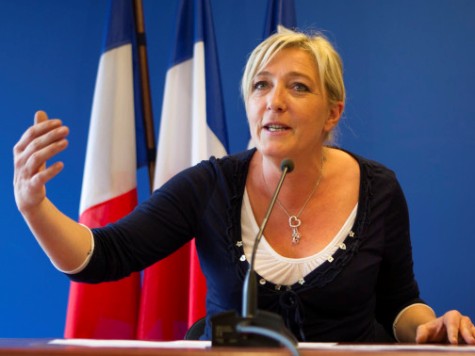Charles de Gaulle once said: “Europe is France and Germany. Everything else is just the garnishes.”
Last night it looked like Europe’s meat and potatoes might be heading in different directions.
While France rocked the Continent with a triumph for Marine Le Pen and her anti-EU National Front, German Chancellor Angela Merkel’s centre-right pro-EU governing coalition emerged with a majestic 35.5 per cent of the vote, untouched by the eurosceptic forces sweeping France, Britain, Denmark, Greece and Italy.
The only real change in Germany was the emergence of the Alternative for Germany (AfD) party, which is anti-euro but not anti-EU. The party supports the EU but hates and fears the way German taxpayers have been forced to underwrite the multibillions in bailout money for the collapsed eurozone economies. It took seven per cent of the vote and will send seven members to the European Parliament.
It took some daring for the AfD to emerge at all, because in Germany there is an orthodoxy that is the EU which keeps Germany pure: to abandon the Union, so the faith goes, Germany would risk stirring up old nationalist spirits.
Meanwhile in France, the new top politician Marine Le Pen was happy to stir up her old nationalist spirits, demanding after her victory that “France must be run by the French, for the French and with the French” and not by “foreign commissioners.”
In Denmark, the eurosceptic Danish People’s Party (DPP) topped the poll with 26.6 per cent, putting their leader, the splendidly named Morten Messerschmidt, back in the parliament with double the number of MEPs from two to four of Denmark’s 13 seats.
The DPP wants Denmark to take back control of its borders and curb benefits paid to citizens of other EU states living in Denmark. In 2009, British Prime Minister David Cameron refused to allow the DPP to join the Tories’ group at the parliament because they found some of Messerschmidt’s policies objectionable. Cameron is now understood to be trying to entice the DPP to leave their alliance with UKIP and join his Conservatives.
But euroscepticism is not all right-wing. Indeed, one could say that this election’s surge against the EU came from the suffering unemployed, overtaxed and indebt workers, traditional socialist supporters, who have born the worst of the eurozone crisis and now are voting in rage.
British commentator Ambrose Evans-Pritchard has characterised this election as “a verdict on debt servitude.”
In Greece, this meant a lurch to the far left, with the Syriza party of Alexis Tsipras topping the poll. His party has demanded the government abandon the austerity policies designed by the EU and IMF. As the election results were announced, he said his party’s victory robs the government of any “political or moral legitimacy” to continue with the painful economic and fiscal policies.
He demanded a general election be called immediately.
At the same time, the Greek voters sent three members of Golden Dawn anti-EU to the parliament, from a party that its critics call neo-Nazi.
In Spain, where there is no eurosceptic party, there emerged instead a left-wing, anti-EU-impose-austerity party, Podermos, which took almost eight per cent of the vote.
In Austria, a prosperous country by EU standards yet worried by immigration, the eurosceptic Austrian Freedom Party came in third with 19.5 per cent.
In Italy, Beppe Grillo, leader of the anti-EU, anti-euro Five Star Movement, won a spectacular 25.5 per cent of the vote, but failed to top the governing Democratic Party, which took 34.5 per cent, despite the feeble national growth shrinking again in the last quarter.
The suffering Italians are not alone. The EU now has 26m unemployed, most of them trapped in the disastrous European project of the single currency.
The European establishment was tonight bragging that for the first time in the history of the elections to the European Parliament – that first elections were in 1979 – turn-out had actually increased on the previous elections.
It had increased just one-tenth of one per cent at best. And they were bragging.
But you have to wonder why the eurocrats were bragging at all. You could guess that the only thing that kept the anaemic turnout up was just voters driven to the polls by anger.

COMMENTS
Please let us know if you're having issues with commenting.